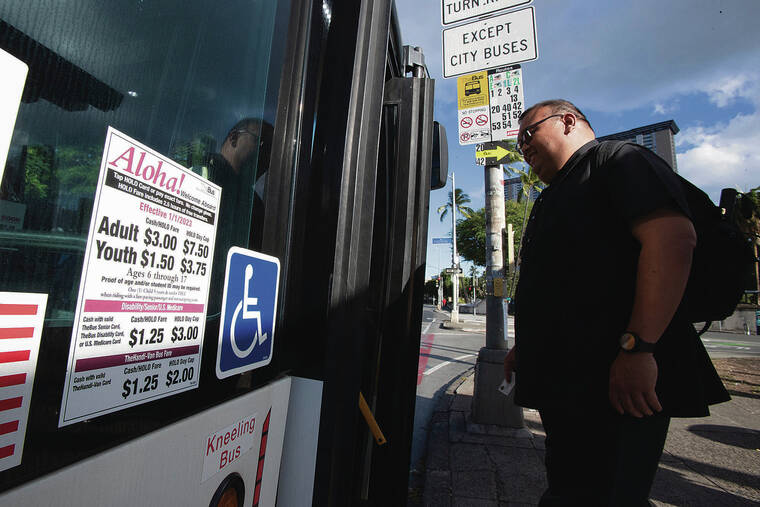Copyright staradvertiser

A Honolulu City Council resolution urges the city administration to quash a decades-old cost recovery policy for the city’s mass transit system to stave off service cuts and potential fare increases for low-income riders on Oahu. Introduced on Sept. 15 by Council member Tyler Dos Santos-Tam, Resolution 262 asserts the city’s current fare box recovery ratio — which measures how much of the transit system’s operating expenses are covered by the fares passengers pay — has consistently missed targeted goals. Those fares cover TheBus and other public transit options. “The Council believes that subsidizing the transit system is a worthwhile use of city funds, and would like to repeal the policy on funding the operating cost of the city bus system with specific farebox recovery ratios,” the resolution states. The resolution notes in the year 2000 a prior Council established the city’s fare box recovery ratio of not less than 27% and not more than 33% of operating costs. By 2019, the Council established that the transit recovery ratio not fall below 25% nor exceed 30% of operating costs. According to the city administration’s annual reports, Honolulu initially complied with its fare box recovery ratio policy for many years. However, the city has not complied with that policy from 2017 through 2024, the legislation asserts. “It is anticipated that the city will not comply with the farebox recovery ratio policy for fiscal years 2025 and 2026,” Resolution 262 states. “The Council finds that adherence to a predetermined farebox recovery ratio hinders efforts to expand and improve public transportation services, particularly in times of unforeseen circumstances or economic downturns.” In other jurisdictions on the U.S. continent, public transit fare box recovery policies have been repealed, including at the Maryland Transit Administration and the Denver Regional Transportation District, the resolution states. And jurisdictions considering repeals of similar policies include Illinois and California, the legislation says. During the Council’s Infrastructure, Transportation and Technology Committee meeting on Sept. 24, Dos Santos-Tam called on the Blangiardi administration to abandon Honolulu’s transit recovery policy as well. “It’s basically a policy that says, ‘for the amount of money that we spend on TheBus, that percentage … is the goal to have generated from passenger fares,’” Dos Santos-Tam said. “And since 2000, we have not met this policy. Then, in 2019, because we weren’t meeting that policy … we lowered the percentage, to 25% and 30%.” He added the city policy offers “no penalty” either. “No one gets fired if we don’t meet this, no one gets fined if we don’t meet this,” he said. “It’s simply words on paper, and I’d rather have metrics that we can actually stick with and actually use as a useful measure.” Roger Morton, the city Department of Transportation Services director, said he could not dispute those assertions. However, “I personally think that similar types of policies are useful,” Morton told the committee. “In this case, I think with the major shock waves that have hit public transportation across the nation, including COVID, including the migration to rideshare … and also the fact that we have an incomplete rail system now, that has large costs, but really doesn’t have large ridership, and therefore doesn’t have a large revenue coming from it.” Although he did not object to Resolution 262, Morton indicated revenue models for the city’s public transit system will likely change when Skyline reaches downtown Honolulu by 2030. Skyline’s Segment 2, which runs past the airport, opened for public revenue service on Oct. 16. Under Council questions on why the city has not met its fare box recovery goals, Morton noted an increase in costs of the city’s public transit system and reduction in ridership following the COVID-19 pandemic contributed to not meeting the policy goal. Others, like the Ulupono Initiative, which advocates for public mass transit options, support abolishing the city’s transit recovery policy. In written testimony, Ulupono’s director of government affairs, Micah Munekata, wrote, “it is worth noting that a farebox recovery ratio at this level is uncommon among urban systems, where many cities see ratios well below 10 percent, if they use them at all.” “Moving away from this rigid benchmark will allow Honolulu to focus instead on strategies that encourage ridership growth and improve the overall quality of service, ensuring our transit system continues to meet the needs of the community,” he wrote. The Council’s Budget Committee — which briefly discussed Resolution 262 on Oct. 14 — later passed the legislation for full Council adoption. The next full Council meeting is scheduled for Nov. 5. The call for changes to the city’s transit fare box recovery policy follows the Council’s postponement of a plan to increase fares for riders of TheBus, TheHandi--Van and Skyline for the first time since 2022. On Oct. 14, the panel’s Budget Committee voted unanimously to defer Bill 54 — a measure formally requested by DTS — citing the need to further study a measure that calls for a new fare structure for the city’s public transit system. Previously, DTS said the proposed fare hikes were necessary due to rising operational and maintenance costs across the system. As initially proposed, Bill 54 could increase the annual adult fare from $880 to $990; and the monthly adult fare would rise to $90, up from the current charge of $80 — a 12.5% price increase for both. In November 2024, Morton told the Honolulu Rate Commission that annual costs to run the city’s buses were $244.8 million; for TheHandi-Van, $53 million; and for Skyline, about $76 million. Morton also told rate commissioners a proposed fare increase to DTS could generate about $4.4 million in additional revenue for the city’s transit system.



